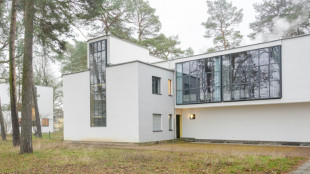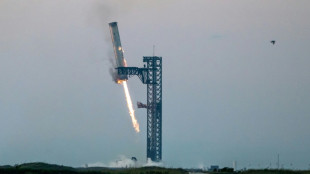-
 Equities mixed as US inflation, China data loom
Equities mixed as US inflation, China data loom
-
UK inflation dips, easing some pressure on government

-
 India's triple naval launch shows 'self-reliance': Modi
India's triple naval launch shows 'self-reliance': Modi
-
Wallabies great Hooper set for comeback aged 33 with Japan move

-
 German bourse banks on Trump-fuelled crypto boom
German bourse banks on Trump-fuelled crypto boom
-
Record 36.8 million tourists visited Japan in 2024

-
 Trump's policies won't push up inflation, economic advisor says
Trump's policies won't push up inflation, economic advisor says
-
German far-right AfD takes aim at Bauhaus movement

-
 Djokovic makes slice of history as Zheng stunned in Melbourne
Djokovic makes slice of history as Zheng stunned in Melbourne
-
The journalists behind Sarkozy's Libya corruption woes

-
 SpaceX set for seventh test of Starship megarocket
SpaceX set for seventh test of Starship megarocket
-
Record-setting Djokovic trumps Federer on way to Melbourne third round

-
 Private US, Japanese lunar landers launch on single rocket
Private US, Japanese lunar landers launch on single rocket
-
Spanish youth ditch dating apps for 'real life' love

-
 Pakistan plot spin blitz as West Indies return after 19 years
Pakistan plot spin blitz as West Indies return after 19 years
-
Alcaraz tips 'incredible' Fonseca to be among world's best 'soon'

-
 Stunned Zheng blames lack of warm-up for early Melbourne exit
Stunned Zheng blames lack of warm-up for early Melbourne exit
-
Ominous Alcaraz 'really, really happy' with Australian Open form

-
 Pakistan's Imran Khan defiant even as longer sentence looms
Pakistan's Imran Khan defiant even as longer sentence looms
-
Bangladesh's Yunus demands return of stolen billions

-
 Relieved Sabalenka defies serve struggles to stay alive in Melbourne
Relieved Sabalenka defies serve struggles to stay alive in Melbourne
-
Zheng out in Melbourne shock as Sabalenka, Osaka battle through

-
 Osaka gets 'revenge' on Muchova in Australian Open fightback
Osaka gets 'revenge' on Muchova in Australian Open fightback
-
Mitchell leads Cavs over Pacers, Thunder beat 76ers

-
 S. Korea's Yoon: from rising star to historic arrest
S. Korea's Yoon: from rising star to historic arrest
-
Ominous Alcaraz sweeps into Australian Open third round

-
 'Queen Wen' deposed in huge shock at Australian Open
'Queen Wen' deposed in huge shock at Australian Open
-
Vigilante fire clean-up launched by local Los Angeles contractor

-
 Zheng dumped out in huge shock as shaky Sabalenka battles through
Zheng dumped out in huge shock as shaky Sabalenka battles through
-
Asian equities mixed as US inflation, China data loom

-
 'Queen Wen' Zheng deposed in huge shock at Australian Open
'Queen Wen' Zheng deposed in huge shock at Australian Open
-
Renewed US trade war threatens China's 'lifeline'

-
 China's economy seen slowing further in 2024: AFP survey
China's economy seen slowing further in 2024: AFP survey
-
Shaky Sabalenka overcomes serve struggles to stay alive in Melbourne

-
 South Korea's six weeks of political chaos
South Korea's six weeks of political chaos
-
Japan's tourism boom prices out business travellers

-
 What is the pink stuff coating fire-ravaged Los Angeles?
What is the pink stuff coating fire-ravaged Los Angeles?
-
Mediators make final push for Gaza truce deal

-
 Musk, Bezos, Zuckerberg to attend Trump inauguration: report
Musk, Bezos, Zuckerberg to attend Trump inauguration: report
-
Federal probe begins into deadly Los Angeles fires

-
 'We may look easy-going, but...' Canadians veto Trump's merger plan
'We may look easy-going, but...' Canadians veto Trump's merger plan
-
Is obesity a disease? Sometimes but not always, experts decide

-
 Biden issues land protections after LA fires delay ceremony
Biden issues land protections after LA fires delay ceremony
-
Cuba to free over 550 prisoners after removal from US terror list

-
 Williams, Vine vie for season-opening Tour Down Under crown
Williams, Vine vie for season-opening Tour Down Under crown
-
Maresca 'concerned' as Chelsea winless run stretches to five games

-
 'Outstanding' Liverpool deserved more than Forest draw: Slot
'Outstanding' Liverpool deserved more than Forest draw: Slot
-
Guardiola laments Man City decision-making in Brentford collapse

-
 Marseille dumped out of French Cup on penalties
Marseille dumped out of French Cup on penalties
-
Liverpool frustrated by Forest, Man City blow late lead at Brentford

Vote counting begins in tightest ever Angolan election
Ballot counting began in Angola Wednesday after polls closed in what was widely seen as the most competitive vote in the country's democratic history, with incumbent President Joao Lourenco squaring up against charismatic opposition leader Adalberto Costa Junior.
The election has been overshadowed by Angola's many woes -- a struggling economy, inflation, poverty and drought, compounded by the death of a former strongman president.
The People's Movement for the Liberation of Angola (MPLA), which has ruled the oil-rich nation for nearly five decades, faced its most serious challenge since the first multiparty vote in 1992.
Eight political parties were running, but the real contest lay between the MPLA and its long-standing rival and ex-rebel movement the National Union for the Total Independence of Angola (UNITA).
Pre-voting opinion polls suggested that support for the MPLA -- which won 61 percent of the vote in 2017 elections -- would dwindle, while the UNITA -- which has entered an electoral pact with two other parties -- would make gains.
But UNITA's inroads might not be enough to unseat Lourenco, 68, who succeeded veteran leader Jose Eduardo dos Santos five years ago.
Dozens of voters lined up at polling stations in the early morning, but by midday they were just a trickle.
Both leading candidates -- Lourenco at the capital's Lusiada University and Costa Junior in the working-class Nova Vida district -- called on the public to make their voices heard while casting their ballots.
Some stations started to close in the early evening about an hour before the scheduled time, with no more would-be voters in sight, according to AFP reporters.
- 'Closer than ever' -
Costa Junior, 60, is popular among youth -- a significant and growing voting bloc -- and has pledged to "eradicate poverty" and create jobs.
Analyst Justin Pearce said the race looked "very competitive".
"The further we've gotten from the civil war, the less currency... the MPLA has had," said the history lecturer at South Africa's Stellenbosch University.
"The outcome looks like it's going to be closer than ever before."
The MPLA traditionally wields a grip over the electoral process and state media in Angola, and opposition and civic groups have raised fears of voter tampering.
In the working-class district of Cazenga, 57-year-old Miguel said he would welcome the vote's outcome, whatever it was.
"We have to accept the results, it's the democratic game," he said, without giving his surname.
But Alberto Bernardo Muxibo, another voter, disagreed.
"We don't have a real democracy. The government oppresses the people," he said.
- Poverty and graft -
Lourenco, a Soviet-educated former general who had promised a new era for Angola when he was first elected, is credited with making far-reaching reforms in one of southern Africa's economic powerhouses.
"The West would not mind an MPLA victory -- even with concerns of vote rigging," said Johannesburg-based analyst Marisa Lourenco said.
"Governments and companies abroad prefer stability over change".
But little has changed for most of Angola's 33 million people, for whom life is a daily grind.
Angola is Africa's second largest crude producer, but the oil bonanza also nurtured corruption and nepotism under dos Santos, who died in Spain last month.
The low-key, night-time repatriation of his remains in the final leg of campaigning has added a macabre touch to the election.
Dos Santos will be buried on Sunday, which would have been his 80th birthday.
Angolans living overseas were for the first time able to cast ballots from abroad.
Results are expected within a few days. In past elections, results have been contested, in a process that can take several weeks.
M.Ouellet--BTB
